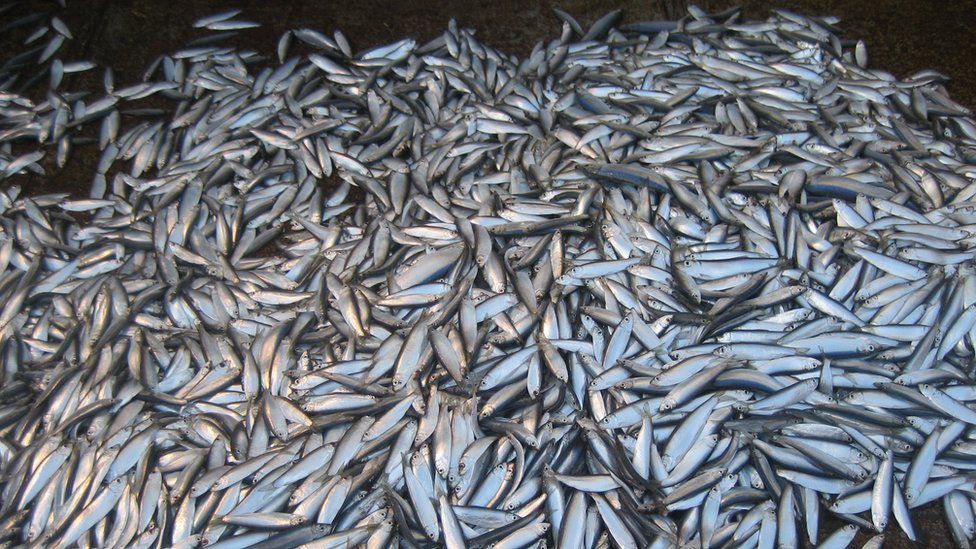Cod and haddock 'may vanish' from Scotland's west coast
- Published
- comments

Herring are among the cold water species predicted to vanish from Scotland's west coast
Cod, herring and haddock could migrate away from Scotland's west coast waters because of warming sea temperatures, according to researchers.
Scientists at the Scottish Association for Marine Science (Sams) predict the cold water species will vanish from the west coast by the year 2100.
The researchers suggest the fish are already nearing "edge of their temperature tolerance range".
However, they add that global warming will see other species replace them.
The Scottish government said it was following scientific advice on how to support Scotland's fishing industry.
Cod, herring and haddock are commercially important species to Scotland.
The researchers at Sams, which is near Oban and part of the University of the Highlands and Islands, warn that climate change could lead to the fish moving away to colder waters further north.
'Sustainable fisheries'
But over the forthcoming decades these species would "gradually be replaced by more abundant communities" of saithe, hake and whiting, the scientists said.
They said that from 1985 to 2013 the population of saithe and hake had increased four-fold off Scotland's west coast.
Sams research has been published in the journal Scientific Reports.
Cod could migrate to colder waters further north, say scientists
The paper's lead author, marine ecologist Dr Natalia Serpetti, said: "These results highlight the importance of considering environmental change, as well as fishing quotas, to achieve sustainable fisheries management at an ecosystem level.
"We initially tested the impact of current advised fishing quotas, along with predator/prey interactions, within the ecosystem.
"Cod, whiting and herring stocks, that historically showed declining trends due to high fisheries exploitation and predation, recovered under a sustainable fishery management.
"However, we subsequently tested the impact of rising temperature under Intergovernmental Panel on Climate Change (IPCC) climate change scenarios, while keeping fishing rates consistent with current advised maximum sustainable yields, and found that there would be a collapse of cold water species stocks."
'Stocks collapse'
She added: "Our results showed that warmer climate could jeopardise sustainable fishery management: rising temperature showed strong negative impact on cold water species such as grey seals, cod, haddock and herring, which all declined by 2100 under the worst case climate warming scenario.
"Even under the best case climate change scenario, cod and herring stocks were predicted to collapse off Scotland's west coast."
Dr Serpetti's research updated an existing marine model of the west coast of Scotland ecosystem, situated in the north-east Atlantic from the coastline to the edge of the continental shelf.
Her model looked at how rising temperatures would affect 41 groups of species, from top predators such as whales and seals to many fish species and animals such as crabs and snails living on the sea floor.
The research is part of the Marine Ecosystem Research Programme, funded by the Natural Environment Research Council and the Department for Environment, Food and Rural Affairs.
The Scottish government said it recognised that climate change was "a major threat" to Scotland's marine ecosystems and was following scientific advice to support a sustainable fishing industry.
A spokesperson said: "Scotland is recognised as being at the forefront of the global fight against climate change and continues to lead the UK in reducing greenhouse gas emissions.
"To continue this progress, our Climate Change Plan and Energy Strategy will include the bold new commitments for low-carbon transport, infrastructure and energy efficiency that we set out in the Programme for Government, policies aimed at driving down emissions by 66% by 2032."